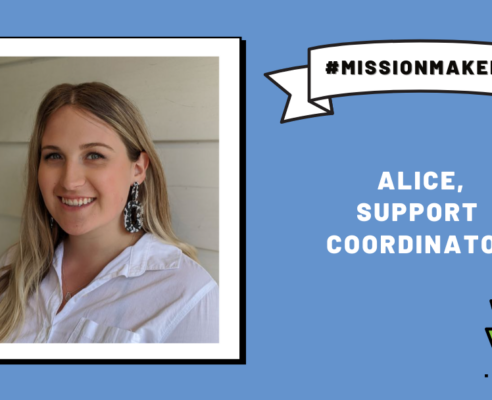
Mission Makers: Alice—connecting with kids!
Each month, our blog series “Mission Makers” features the story of a staff member. This month, Alice tells us that her favourite part of working at LDS is interacting with the kids.
Learn More
The Learning Disabilities Society (LDS) is lucky to have so many excellent and unique instructors to match with our students. One of these instructors, Rachel Y., is not only calm, patient, and kindhearted, she also brings a holistic outlook to her approach to remedial instruction.
Rachel’s varied work experience contributes to her current role of providing Research-informed Individualized Student Education (RISE) to students at our East Vancouver Learning Centre and online through our RISE at Home Program.
Rachel began her career by pursuing a Bachelor of Science in Kinesiology, the study of human body movement. She then went on to help children with developmental delays, physical disabilities, and learning disabilities. She’s also worked with children to improve their academic, social, communication, and life skills. Rachel is delighted to see students making progress. “Giving children the tools to express themselves,” she says, “makes all the difference in their confidence and enthusiasm to continue learning.”
It was Rachel’s experience working individually with one student with physical and learning differences that taught her the importance of having a student-focused curriculum, something that is central to LDS’ RISE programming. By adjusting her teaching to coincide with the techniques and strategies the student best responded to, Rachel was able to see the student quickly make progress in their academics and social skills.
Rachel has also worked in children’s summer camps, community support projects, and social inclusion programs (working with participants with various physical and developmental differences). “My biggest take away [from these experiences] is that everyone should be able to participate in their community—pursue things they find interesting, goals they have, and feel confident in their place in the community. To me, this translates to LDS as: ‘students should be confident in themselves as kids, as members of their school and community, but also confident in their schoolwork.’”
Coming to LDS with an exceptional yet unconventional set of educational and work experiences, Rachel was a bit hesitant to apply. “To be honest, I was a little worried…I don’t have experience in a traditional classroom.” But she was excited to work with LDS, an organization with energy and focus. “At LDS, we are always pushing to grow and improve, whether that’s the instruction or new projects; that was really attractive to me. It’s exciting that everyone is always pushing for new growth.”
“Over time,” Rachel says, “I have gained more confidence. I realized that my education and experiences shape how I approach my work at LDS.” Rachel’s favourite aspect of working with LDS is approaching each instructor-student relationship from a different perspective.
While research, curricula, and teaching strategies guide Rachel’s instruction, she likes that she can apply and adapt them in a way that “makes the most sense for the student.” For example, if a student doesn’t like working with flashcards, Rachel will try turning things into a board game or customizing the worksheets to be themed in an activity that the student enjoys, thereby making it more engaging for them.
“Maybe it’s because I don’t come from a traditional teaching background,” Rachel explains. “I think that a student’s academic work is important, but it’s part of a bigger picture.” Rachel’s holistic perspective on remedial instruction and her interaction with students embodies LDS’ goal to impact our students’ lives beyond academics.
“I try not to look at things as strictly academic,” says Rachel, “even though the main objective is to support students in their academics. It’s important to remember [learning differences are] part of a bigger picture and to be supportive in other areas, like emotional support, social skills, executive functioning, and organization skills. Those are all parts of the picture I try to keep in mind to help build a more holistic approach, … [to build] rapport and trust with students because they’re not just coming to work on math or writing for an hour; it’s more than that.”
—Rie
_________________
Rie Stadnichuk (she/her) is the Digital Communications Specialist at LDS. Currently studying Communications and Economics at Simon Fraser University, she hopes to use this opportunity as a way of exploring meaningful work in the field. She is passionate about social issues and creating environments of inclusivity and open dialogue. Rie graciously lives and works on the unceded territory of the Syilx people.